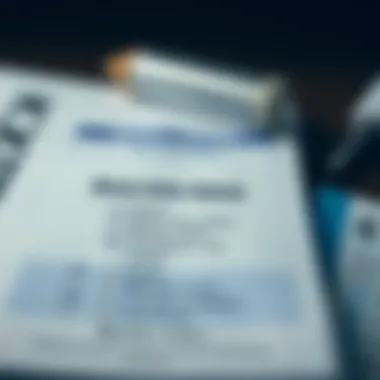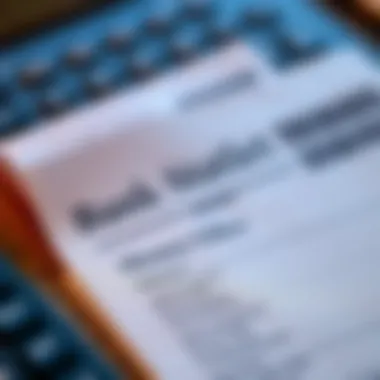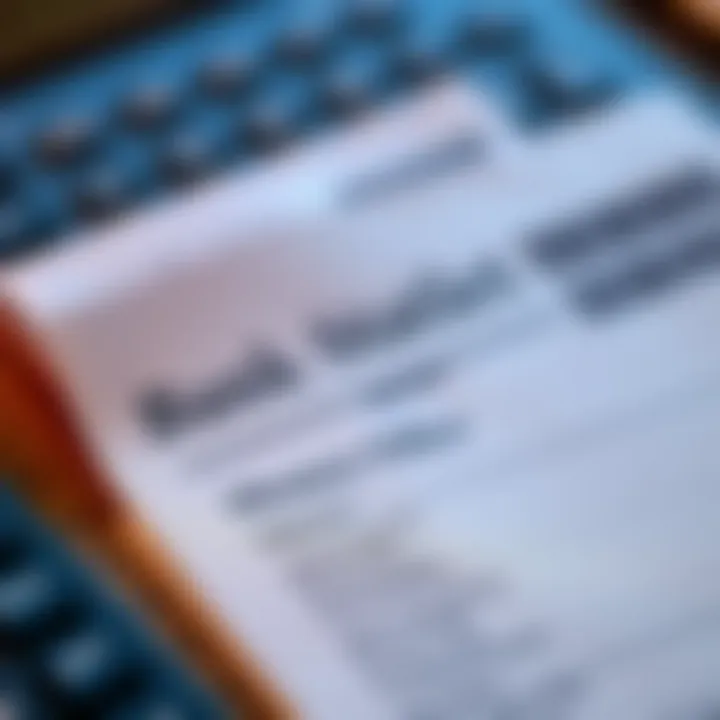Depositing Money Orders: A Complete Guide


Intro
Depositing money orders into bank accounts can sometimes feel as tricky as navigating a maze blindfolded. For many, money orders represent security, often favored for their reliability compared to personal checks. However, the ins and outs of converting these paper currencies into digital funds can raise questions. What banks accept them? Are there fees? These queries are not just trivial, and understanding the full scope of money orders is essential in today’s financial landscape.
In this guide, we will dissect the entire process. By diving deep into money orders, we'll touch upon essential legal aspects, practical considerations, and effective strategies to ensure your transactions not only go smoothly but also serve your financial needs. So, let’s start peeling back the layers of this fascinating subject.
Understanding Money Orders
Money orders play a significant role in the spectrum of financial transactions. They offer an alternative for those who may either not have a bank account or prefer to use a secure method of payment. Understanding the nuances of money orders is key; it helps individuals make informed decisions regarding these payment instruments. This section will untangle the various aspects of money orders, emphasizing their benefits, unique characteristics, and relevant considerations.
Definition of a Money Order
A money order is a prepaid financial instrument that allows the purchaser to pay a specified amount to a designated payee. Unlike checks, which can bounce if there are insufficient funds, money orders require the buyer to pay upfront, ensuring that the funds are available. Money orders can be purchased at various locations, including banks, post offices, and some retail establishments.
This makes money orders an attractive option for many people, especially those who may not have access to traditional banking services. They are typically issued in small denominations and can be an effective means of handling payments safely and securely.
Difference Between Money Orders and Other Payment Methods
When it comes to financial transactions, different methods offer different advantages and disadvantages. Here’s how money orders stack up against other payment methods:
- Checks: Unlike checks, money orders do not carry the risk of bouncing. They provide a guaranteed form of payment, making them more reliable in certain situations.
- Cash: Cash transactions are straightforward, but carrying significant amounts can be risky. Money orders allow for a safer method to send or pay substantial sums without the need to handle physical cash.
- Electronic Transfers: Digital transactions offer speed and convenience, but they may not be available for everyone, particularly those without banking access. Money orders provide an alternative for those wishing to avoid electronic methods.
These distinctions make money orders a compelling choice for specific scenarios where reliability and safety are paramount.
Common Uses of Money Orders
Money orders find utility across various situations. Some common uses include:
- Paying Bills: Many service providers accept money orders for bill payments, primarily for those who prefer not to use electronic payments. This can be particularly useful for utility bills or rent payments.
- Sending Money Internationally: For individuals who need to send money abroad, money orders can serve as a secure method, often accepted in multiple countries.
- Gifting Money: When giving money as a gift, particularly to children or others who might not have a bank account, money orders offer a safe alternative to cash.
- Purchasing Goods: Some retailers accept money orders as a form of payment for products, providing another level of security when buying high-ticket items.
In summary, understanding money orders provides insights into their significance in today’s financial landscape. They offer a unique blend of security, reliability, and versatility that can benefit individuals in numerous ways.
The Mechanics of Depositing a Money Order
Understanding the mechanics of depositing a money order is crucial in ensuring that individuals can efficiently utilize this payment method without unnecessary complications. In a world where quick transactions often reign supreme, knowing the ins and outs of money order deposits becomes a must. This section will walk you through the step-by-step process, the information banks require, and the necessary endorsements—equipping you with the knowledge needed for seamless money order transactions.
Steps to Deposit a Money Order
Depositing a money order might seem straightforward, but there are a few steps you need to follow to make sure everything goes off without a hitch. Here’s how it typically works:
- Gather Required Documents: Collect the money order and ensure you have a valid government-issued ID. If you’re not the payee, additional documentation may be necessary.
- Visit Your Bank or Financial Institution: You can either do this in person or, depending on your bank, you might have options for online or mobile deposits.
- Endorse the Money Order: Sign your name on the back of the money order. If you’re endorsing it over to someone else, make sure to include their name as well.
- Complete Any Required Forms: Some banks may ask you to fill out a deposit slip or provide additional identification information.
- Submit and Confirm: Hand over the money order along with any paperwork to the bank teller or scan it for mobile deposit. Always ask for a receipt to confirm your deposit has been processed.
Each step is vital to minimize potential errors and ensure you can access your funds smoothly.
Information Required by Banks
When it comes to depositing a money order, banks have specific information they need to process your transaction. This includes:
- Identification: Banks typically require a state-issued photo ID, such as a driver’s license or passport.
- Money Order Details: You should have the money order number, issue date, and amount readily available.
- Personal Information: Be prepared to provide your bank account number or other personal identification relevant to the deposit.
The clearer you are about the information and documents required, the less likely it is that you’ll run into snags at the bank.
Formats and Endorsements for Depositing
When endorsing a money order, it’s essential to follow specific formats that can prevent any issues down the line:
- Standard Endorsement: As the payee, simply sign your name on the back, making sure it matches the name on the front.
- Restrictive Endorsement: If you want to limit who can cash it, you might specify it’s for deposit only into your account by writing "For Deposit Only" followed by your account number.
- Third-Party Endorsement: If you're signing it over to another individual, add their name along with your signature. This should be done with caution as it may increase the risk of fraud.
Properly endorsing a money order is key for a successful transaction. Just a misplaced initial or signature can cause problems.
Having a good understanding of the required formats can save you from potential headaches down the road. Keep these tips in mind, and you'll be better prepared to navigate the money order depositing process efficiently.


Bank Policies on Accepting Money Orders
Understanding the intricacies of bank policies regarding money orders cannot be overstated. For anyone looking to deposit a money order, comprehending these policies is crucial. Each bank or credit union may have unique stipulations surrounding the acceptance of money orders that can significantly affect your deposit experience. The distinctions in these policies can dictate not just how you deposit the money order but also how swiftly you can access your funds following the deposit.
General Acceptance Criteria
When it comes to general acceptance criteria, most banks are pretty clear-cut about what they expect:
- Authenticity: Banks generally require that the money order be valid and have no signs of tampering. If it looks fishy, you might find the teller giving you a look that says 'not a chance.'
- Proper Endorsement: Similar to checks, money orders require a signature on the back. So, make sure you put pen to paper before stepping up to the counter.
- Condition: If the money order is torn, crumpled, or in poor condition, it's likely the bank won't accept it. They want something that looks presentable; it's only good business.
- Payee Information: The name on the money order must match your account details. If your name is Bob but it's made out to Robert, that might lead to some questions that can slow your deposit down.
These criteria serve to protect both the bank and the account holder, minimizing the risk of fraud and ensuring that transactions run smoothly.
Variations Among Financial Institutions
Not all financial institutions are created equal when it comes to money orders. While one bank might have a streamlined process, another could have layers of red tape. Here are some differences you might encounter:
- Fees: Some banks might levy a fee for depositing, which varies widely. A community bank in a small town might charge less than a big-name bank operating nationwide. It's worth checking upfront.
- Deposit Limits: Different banks can impose limits on the amount you can deposit via money order, particularly if it exceeds a certain value. For some institutions, a money order over $1,000 may trigger a hold on your funds.
- Immediate Availability: Depending on the bank, money available from your deposit can either be instant or take several business days to clear. Knowing this can spare you from unexpected financial hiccups down the line.
- Branch Policies: Some branches of the same bank may accept money orders while others do not. Due diligence is key, especially if you find yourself at a branch not frequented by you.
Understanding these variations is vital in preparing for your deposit, allowing you to sidestep any sticky situations that may arise at the point of transaction.
Potential Restrictions and Limitations
While depositing money orders can generally be straightforward, there are several restrictions and limitations to keep on your radar:
- Fraudulent Orders: If a money order is suspected of being fraudulent, your transaction will likely be denied. If your bank is particularly cautious, you might find that they want an additional layer of verification before allowing a deposit.
- Country of Issuance: Money orders issued from foreign countries might not be accepted by your bank. You might be excited to cash that order sent from Uncle Joe in Australia, but find that it’s a no-go.
- Expired Money Orders: Money orders come with expiration dates. Typically, if you try depositing one that's beyond its validity period, the bank won’t let you proceed. Always check that potentally valuable document for dates before you head to the bank.
- Amount Limitations on Cash: Some institutions place maximum limits on how much cash you can receive back if you cash a money order in-person rather than depositing it.
Being aware of these potential setbacks can save you time and headaches when you set out to cash your hard-earned money orders.
Fees and Charges Associated with Money Orders
Understanding the fees and charges tied to money orders is pivotal for anyone looking to deposit them into bank accounts. Unlike straightforward cash transactions, money orders can carry a slew of potential costs that vary widely depending on the bank and the context of the deposit. Being aware of these fees not only helps in budgeting but also avoids any surprises down the road that might eat into the expected value of the transaction. Moreover, recognizing these charges can enhance decision-making when choosing between different deposit options or banking institutions.
Common Fees Incurred During Deposit
When it comes to depositing money orders, there are certain fees that people should brace themselves for.
- Deposit Fees: Some banks may charge a specific fee just for processing the deposit. This can range from a few dollars to a higher amount, depending on the institution’s policies.
- Cashiers Check Fees: If you opt to convert your money order into a cashier's check instead, be prepared for additional charges tied to this service.
- Account Maintenance Fees: While not specific to just money orders, maintaining a checking account can come with monthly fees, particularly if the balance falls below a certain threshold after making a deposit.
"A little foresight can save you a boatload of cash when it comes to handling money orders."
Comparing Fees Between Banks
This is where things can get a tad tricky. Not all banks play by the same rules when it comes to fees. Here’s how to navigate through this:
- Researching Rates: Take time to evaluate and compare the various deposit fees across financial institutions. Bigger banks might advertise lower rates, but local or community banks can often offer more personalized services at lower costs.
- Special Offers: Keep an eye out for promotional offers, as banks might waive fees for new customers or under certain conditions. That special deal might be just what you need.
- Word of Mouth: Don’t underestimate the power of talking to friends or online forums, like those found on Reddit, to gather real-time feedback about hidden fees at different banks.
Hidden Costs to Be Aware Of
Beyond the obvious, lurking beneath the surface can be additional costs that shadows the transaction, often going unnoticed until it’s too late:
- Inactivity Fees: If you leave your account dormant for an extended period, some banks might charge inactivity fees that can chip away at your balance.
- Foreign Transaction Fees: If you happen to deposit an international money order, be aware that foreign transaction fees could also apply, adding to the cost of the deposit.
- Currency Conversion Costs: If the money order is not in your home currency, banks often charge a conversion fee that can eat into the amount deposited.
Being informed about these nuances doesn't merely arm you with knowledge; it also helps craft a strategy to make the most of your money orders while keeping costs in check. Making smart financial choices often starts with understanding these vital components.
Legal Framework Surrounding Money Orders
Understanding the legal framework surrounding money orders is crucial for navigating the often murky waters of financial transactions. Money orders are not just pieces of paper; they hold significant weight in terms of legal recognition, security, and regulatory compliance. With their own set of regulations, both at the federal and state level, money orders demand careful attention from users. Knowing these regulations is essential for ensuring that these payment instruments are used effectively and protected against fraud.
Federal Regulations Governing Money Orders
In the realm of federal oversight, the U.S. Department of the Treasury plays a pivotal role in regulating money orders. One key regulation is the Bank Secrecy Act (BSA), which mandates financial institutions to verify the identity of customers engaging in transactions involving money orders. This means if you walk into your bank to deposit a money order, the teller might need to verify your identity. This is not just for the bank's peace of mind; it’s also an effort to combat money laundering and fraud.


Another crucial regulation comes from the Federal Reserve, which outlines the acceptable practices for issuing and processing money orders. These regulations serve to protect both the issuer and the recipient. For instance, regulations require the issuers to maintain a record of transactions, which provides evidence in case of disputes. Additionally, customers should be aware that the Electronic Funds Transfer Act (EFTA) covers certain operations with money orders, adding an extra layer of consumer protection.
State-Specific Regulations to Consider
Each state comes with its own set of laws that govern money orders, which can vary significantly from one state to another. This state-level regulation often focuses on how money orders can be processed, rules for record-keeping, and what constitutes a valid transaction. For instance, some states may require that money orders be backed by sufficient funds before they can be issued, while others might impose specific limits on the amounts that can be transacted.
Moreover, some states have stricter regulations regarding the expiration dates of money orders. This can mean that money orders issued in one state might have different validity terms when presented in another state.
It's important for individuals to familiarize themselves with their state’s guidelines to avoid complications during deposits and ensure legal compliance.
Fraud Protection Measures in Banking
On top of regulatory frameworks, banks have their own fraud protection measures to safeguard customers when they deposit money orders. These include verifying the authenticity of the money order before processing, often by checking serial numbers against national databases. Furthermore, many banks employ sophisticated software that flags suspicious activity, like unusually large deposits or patterns inconsistent with a customer's prior banking behavior.
A key point to keep in mind: if you do encounter a fraudulent money order or if your own money order is lost or stolen, quickly report it to your bank. Quick action can be your best defense against potential losses.
Challenges in Depositing Money Orders
Depositing money orders might seem straightforward at first glance; however, like navigating a winding road, several challenges can crop up. From verifying authenticity to addressing discrepancies, understanding these potential hurdles is essential for a successful transaction. Each aspect can influence not just how quickly the funds become available but also peace of mind throughout the process.
Potential Issues with Authenticity
Authenticity is the linchpin in the world of money orders. A phony money order can lead to a domino effect of financial woes. Whether you’re dealing with a personal payment or a business transaction, confirming the legitimacy of a money order is paramount.
First, it’s worth noting that money orders come with certain security features, much like banknotes. Holders should look for watermarks, microprinting, and other signatures as red flags. Banks typically have procedures in place to assess these features, but individual vigilance cannot be overstated.
A smart practice is to verify the issuer directly. For instance, if the money order comes from a source like Western Union, checking their website for details on validation can save a whole heap of trouble. Always remember, a small step of checking can go a long way in avoiding larger complications.
Dealing with Lost or Stolen Money Orders
The sense of violation that comes from losing money feels difficult to shake off, and when it’s a money order, it adds another layer of complexity. If a money order is misplaced or worse, stolen, it can lead to significant delays and even financial loss.
First things first, consumers should always keep track of their receipts and serial numbers. It’s akin to holding a safety net in the event of an unfortunate mishap. In case the order is lost, reporting it to the issuing authority promptly can initiate a replacement process. Most organizations have specific timeframes and requirements to file a claim, which one must adhere to strictly.
Finally, one must remain vigilant about upcoming deadlines, especially when dealing with checks and money orders that have an expiration date. Keeping clear records can prove beneficial when filing for a lost money order claim.
Discrepancies in Amounts and Payees
Discrepancies can rear their head in various forms, often creating a tangled web of issues. For example, the amount stated on the money order can differ from what’s received at the bank, or the name on the order doesn't match the account holder’s name precisely. Such mix-ups need addressing to avoid complications.
It’s crucial for holders to double-check the amount before cashing or depositing.
An unnoticed error can mean a future headache and a long waiting time for resolution.
Additionally, if payees mismatch, particularly in sensitive transactions, banks may outright reject the order. Verification steps such as confirming details with the issuer can help mitigate the issue before it reaches the bank.
In summary, dealing with discrepancies may require patience, but it’s achievable with a little diligence. Keeping an open line of communication with the bank and understanding their policies can ease the process.
Alternatives to Bank Deposits
When it comes to handling money orders, sometimes folks find themselves wanting options beyond traditional bank deposits. In the hustle of daily life, having various ways to access funds can be crucial. Let's explore some practical alternatives to bank deposits, revealing their unique characteristics and benefits.
Cashing Money Orders at Retail Locations
Cashing a money order at retail locations is like finding the silver lining on a cloudy day. Major stores, grocery chains, and check cashing services frequently accept money orders. This option can be quite convenient if you’re nearby and need quick cash. Here are some important points to consider:
- Fees: Make sure to inquire about service fees, which may differ between locations.
- Identification: Retailers will usually require valid ID for cashing a money order. A government-issued ID works best.
- Instant Access: Many individuals prefer this method since you can walk out with cash almost immediately.
"Cashing your money order has never been easier, find a nearby retailer, and you're all set!"
In a nutshell, cashing money orders at retail spots is a viable route for those with limited bank access or who just prefer the immediacy of cash on hand.


Using Mobile Deposit Features
As technology makes our lives easier, mobile deposits serve as a shining example. Many banks now offer mobile apps that allow customers to deposit money orders from the comfort of their homes. Here are some essential aspects to weigh:
- Convenience: With just a few taps on your smartphone, you can deposit without stepping outside. Handy during a busy day or bad weather!
- Deposit Limits: Be aware that banks often impose limits on the amount you can deposit via mobile, which can vary by institution.
- Clear Images: Ensure the money order is clearly visible and well-lit when capturing images for deposit. Blurry photos can lead to rejection of your deposit.
- Processing Time: Keep in mind that some financial institutions may take longer to process mobile deposits compared to in-person transactions.
This option stands out for its flexibility and instant access to banking services usually associated with traditional deposits.
Exploring Prepaid Debit Card Options
Prepaid debit cards offer another layer of choice when dealing with money orders. They provide a way to load funds directly onto the card, which can then be used just like a standard debit card. Here’s why you might want to consider this route:
- Flexibility: Use this card for purchases online, over the phone, or at points of sale, just as you would with a regular debit card.
- Budget Control: You're only spending the amount loaded on the card. It’s a good way to manage your expenses without the risk of overdraft fees.
- Low Fees: While some prepaid cards come with monthly fees, others may only charge when you load funds or ATM withdrawals, making it a budget-friendly alternative.
- Widespread Acceptance: Prepaid cards are accepted pretty much everywhere that Mastercard or Visa is accepted.
In summary, these alternatives offer swiftness, accessibility, and security when managing your money orders. Each route provides distinct benefits that cater to various needs and preferences. So whether you prefer the convenience of cashing in at a store, the ease of mobile deposits, or the versatility of prepaid debit cards, it's all about finding what works best for you in the world of finance.
Best Practices for Depositing Money Orders
When it comes to depositing money orders, adhering to best practices is not just smart – it’s essential. Properly managing this process can save time and maintain the integrity of your funds. Whether you’re someone who often relies on money orders for transactions or just an occasional user, being informed helps ensure smooth deposit experiences.
Timeliness in Depositing
One of the cornerstones in the money order deposit process is timeliness. Money orders, like checks, have expiration dates and need to be deposited within a certain timeframe. While some issuers offer a period of six months before a money order expires, others may cut it shorter.
Here's what to consider:
- Act Promptly: As soon as you receive a money order, don't wait around. The sooner you deposit, the less risk you face should it be lost or stolen.
- Avoid Last-Minute Rush: Depositing just before the expiration date can lead to stress. If there are any issues with your bank, you want time to address them without the clock ticking down.
Timeliness also plays a crucial role in managing your bank balance effectively. Having funds available quickly allows you to plan your next financial moves without unnecessary delays.
Maintaining Documentation of Transactions
Keeping a thorough record can make a world of difference when everything fits together like a well-oiled machine.
Here are some practical steps:
- Save Receipts: Always keep the receipt that comes with the money order as proof of purchase. This can help resolve disputes should any arise.
- Record Deposits: Note the amount and date of the deposit into your bank account. A simple notebook or digital app can make this easy.
- Track Your Records: Regularly review your bank statements and ledger against your receipts to ensure everything matches up neatly. This practice can alert you to any possible discrepancies or errors.
Documentation is also your safety net should you ever need to trace your steps or confirm a transaction's legitimacy.
Consulting with Bank Representatives
Interactions with bank staff can offer insights beyond the typical deposit procedure. Always remember:
- Ask Questions: Don’t hesitate to inquire about the bank's specific policies regarding money orders. This includes details about fees, processing times, and any holds they might place on your funds.
- Clarify Required Information: Different banks may ask for distinct information when processing money orders. Ensure you understand what is required to prevent any hiccups.
- Keep Updated: Banking policies can change, so maintaining open communication will keep you in the loop about any new processes or requirements that may arise.
Involving your bank in the process can extract another layer of assurance about your deposits. So, next time you visit your branch, feel free to discuss concerns or seek advice regarding money orders.
"Keeping your lines of communication open not only builds trust but can also prevent unnecessary hiccups in your banking experience."
By putting these best practices into action, a smoother experience awaits when depositing money orders, thus allowing you to focus on your financial journey without the snags.
Finale: Navigating Money Order Deposits
Navigating the waters of money order deposits can feel like a high-stakes game for many. Understanding this process is paramount, not just for convenience, but also for ensuring that your financial dealings remain seamless and secure. This article has peeled back the layers on various aspects of depositing money orders—each detail critical to grasping the broader picture.
Summary of Key Points
To start, let’s revisit some core elements that were covered in this guide:
- Understanding Money Orders: We delved into what constitutes a money order, clearly distinguishing it from cheques and cash. The unique uses for money orders, whether for securing a rent payment or remitting funds to someone without a bank account, were also highlighted.
- The Mechanism of Depositing: Emphasis was placed not just on the step-by-step process of placing a money order into your bank account but also on the necessary information banks require from customers. This includes endorsements and the formats that are often acceptable.
- Bank Policies and Variation: Financial institutions may not be cut from the same cloth. Their differing stances on accepting money orders can lead to potential complications, hence understanding these nuances could save customers from potential pitfalls.
- Fees and Financial Considerations: Fees differing across banks might take the sheen off the benefits of money orders. It’s vital to be in the know about both visible and hidden costs that can pop up throughout the depositing process.
- Legal Framework: Understanding federal and state-specific regulations ensures that one doesn’t inadvertently slip up legally—this part of the process can’t be overlooked.
- Challenges and Alternatives: Whether dealing with issues of authenticity or lost orders, the road can get bumpy. Knowing the alternative methods available, be it cashing at retail or utilizing mobile deposits, is also crucial.
Final Thoughts on Practical Considerations
As we wrap things up, it’s essential to take practical considerations into account while dealing with money orders. Promptly depositing money orders can prevent various headaches down the line. Always keep documentation of transactions; this not only aids in organizing your finances but also serves as proof if disputes arise.
Consulting with a bank representative offers clarity specific to your bank’s policies and might just help avoid unnecessary hassle. In today’s self-service world, having a human touch isn't just comforting—it's often enlightening.















